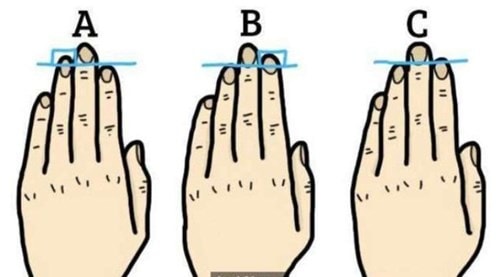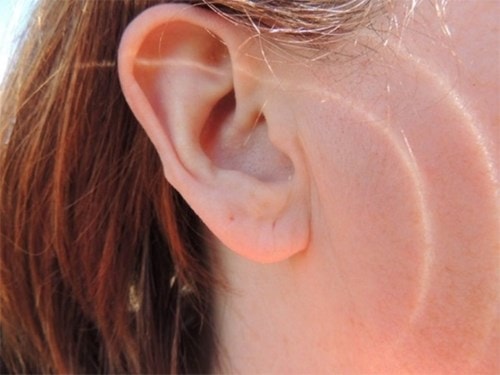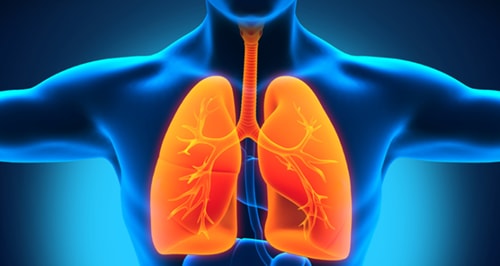Physical characteristics that show you are unlikely to live long
Short index fingers, long legs, small calves, large breasts, wrinkled earlobes... are signs that you may have many health problems leading to a short life.

The American magazine Fox News lists 10 physical characteristics that can be signs of disease that are directly related to human health and longevity. Research shows that women whose index fingers are shorter than their ring fingers often have low estrogen levels and are more likely to develop knee osteoarthritis. The same is true for men.
Experts advise people with index fingers shorter than ring fingers to increase knee exercises to prevent arthritis. One simple exercise is to sit up straight, with both legs parallel to the ground, bend down and hold for 10 seconds, then straighten your back. Repeat 10 times.

A French study found that women with calf circumferences less than 33 cm are more likely to develop atherosclerosis and have an increased risk of stroke. Large calves indicate a thick layer of subcutaneous fat that helps absorb and store fatty acids in the blood, reducing the risk of stroke. To improve health, doctors advise people with very thin calves to drink green tea to keep the heart healthy and reduce the risk of stroke.

A PNAS study found that women taller than 157.5 cm may lack a gene mutation that helps them live longer. Experts advise tall people to practice healthy living habits, quit smoking, drink less alcohol, and eat less meat.

The American Journal of Neurology published research results showing that some elderly people who cannot distinguish the smell of bananas and lemons have a rate of Parkinson's disease 5 times higher than normal. Scientists explain: The area responsible for the olfactory function of the brain is where Parkinson's first invades. The condition of reduced smell appears 2 to 7 years before the disease develops. People with such signs of smell should take fish oil to increase the brain's resistance.

The American Journal of Medicine reports that if a person has linear wrinkles on their earlobes, their risk of heart disease is higher. If one earlobe has wrinkles, the risk of heart disease increases by 33%. If both earlobes have wrinkles, the risk increases by 77%. Although the specific cause is not clear, experts believe that earlobe wrinkles may be due to a lack of elastic fibers leading to arteriosclerosis. People who start to see earlobe wrinkles should pay attention to heart disease prevention, a low-cholesterol diet, and pay more attention to blood pressure.

A Canadian medical journal published a study by scientists after considering diet, family history, obesity, smoking and other factors found that women with large breasts are 1.5 times more likely to develop diabetes. Fatty tissue in women's breasts is very sensitive to hormones that affect insulin resistance, causing diabetes. This group of people need to exercise continuously at high intensity.

A study published in the American Journal of Neurology found that people with large bellies in their 40s are 3.6 times more likely to develop cognitive impairment after age 70. This group should pay attention to their diet, eat more foods containing unsaturated fatty acids such as dark chocolate, olive oil, nuts and increase exercise.

Another study published in the journal Neurology said that women with short arms will increase the risk of cognitive disorders by 50% compared to normal. You can check by standing straight, two arms spread parallel to the ground. Measure the length from the tip of the left middle finger to the tip of the right middle finger. For adult women, this length is at least 152 cm. People with very short arms should increase hand activities, for example, painting, pottery...

A large Harvard study found that people with blood types B and AB had a 44% higher risk of pancreatic cancer than those with type O. This may be because the genes that determine blood type affect the pancreas. These people can take vitamin D supplements, consume low-fat dairy products and salmon.

The British Journal of Epidemiology and Community Health published that women with legs between 50.8 and 73.7 cm have higher than normal liver enzyme levels. Therefore, experts advise this group of people to limit alcohol consumption, not to drink more than 142 ml of wine or 341 ml of beer per day. When doing housework, wear gloves and masks to avoid contact with toxic chemicals.
According to VNE
| RELATED NEWS |
|---|








